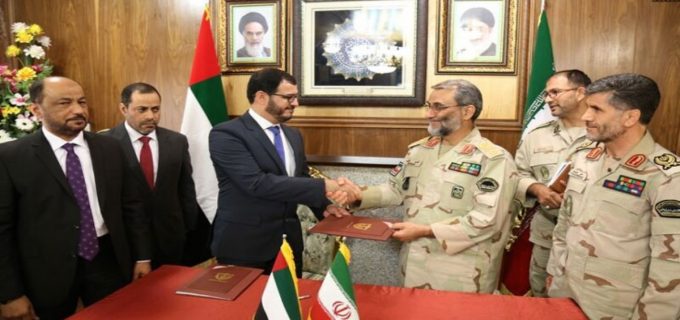On July 30, a high-level UAE security delegation paid a visit to Iran, which was disclosed by the Iranians. This made the UAE situation very embarrassing, especially as this visit comes amid siege and psychological war on Iran and as UAE is Saudi Arabia’s ally in the confrontation of Iranian influence in Yemen.
The UAE has underestimated the importance of the meeting, contrary to the Iranian interpretation of it. Perhaps what assures the Iranian interpretation is that the meeting addressed pivotal issues on the possibility of information exchange and cooperation for the protection and stability of territorial seas.
This visit reflected the rapprochement between the two countries, especially after the tense security situation in the Strait of Hormuz, and reflected the state of security instability the Gulf States have been facing in light of the increasing threats in the region.
This paper is an assessment of the situation that investigates the reasons behind the change in the UAE’s stance towards Iran. Does this change reflect a strategic position that Abu Dhabi will adopt in its policy in the region in the next phase, so as it would be the beginning of change in the map of alliances in the region; or is it just a common meeting? What are the implications of this sudden change on the Saudi-UAE relations? How will it reflect on the common files between the two countries?
UAE-Iranian Relations
Historically speaking, despite strained UAE-Iranian relations due to the latter’s occupation of three UAE islands (Greater Tunb, Lesser Tunb, and Abu Musa) on November 30, 1971, days before the UAE’s independence on December 2, 1971, the two countries have maintained economic relations that were considered as the strongest in the Gulf Region.
The UAE has maintained strong economic relations with Iran during the crisis with Qatar, which is accused of collaborating with Iran, as the latter became the second largest UAE export market in 2016, reaching $ 8.8 billion. In 2017, the volume of trade exchange reached $ 11.114 billion. Iranian exports constituted $ 4.458 billion, while UAE exports to Iran amounted to $ 6.656 billion.
In 2018, Iran’s exports to the UAE amounted to 14.7% of the weight, and 16.17% of the total value of Iranian exports to the world, which makes the UAE the first importing country from Iran.
According to the Iranian news agency IRNA, the UAE has maintained its advanced position in trade relations with Iran, because it ranked second in the world and first in the Arab world in terms of trade exchanges with it during the previous year. China ranked first in terms of the volume of exports to Iran, amounting to 11.5 billion dollars, representing 24% of the total Iranian imports, which amounted to 47.6 billion dollars. The UAE came second with exports of $ 8.7 billion, representing 18% of Iran’s total imports. In addition, there are many Iranian companies in the UAE. According to the local Iranian Business Council, about 8,000 Iranian traders and commercial companies are registered in the UAE.
The Iranian community is the largest in the UAE, with more than half a million Iranians living in the UAE, making it the biggest resident community in the country. 10,000 Iranian companies are active in various economic sectors such as retail and real estate. According to estimates by the Iranian Business Council, Iranians residing in the UAE have investments and assets of more than $ 200 billion.
Contexts of change in UAE-Iran relations
With the outbreak of war in Yemen and the formation of the Arab Coalition, the UAE found itself an ally of regional foes (Riyadh and Tehran). It nevertheless worked to create political-military cooperation with Saudi Arabia, which had been increasingly needed after the crisis with Qatar, while at the same time Abu Dhabi maintained its economic security alliance with Iran.
The UAE joined Saudi Arabia in its military alliance to fight the Houthi militia in Yemen, to stop the Iranian threat to the Gulf security. After five years of the start of the coalition without achieving the desired results, the high war costs in light of international criticism, in addition to the tense security situation in the Gulf interior, due to the Houthi escalation, Abu Dhabi has come to the conclusion that this situation cannot be resolved through a military solution alone, making it reconsider its strategies in the region, according to its foreign ministry, which raised conflict between it and Saudi Arabia.
This conflict has not been the main reason for the UAE-Iran closeness, but there have been other reasons associated with the accumulation of a number of challenges and developments in the region, and led to the occurrence of this rapprochement. The most noticeable reasons can be listed in the following points:
1- The UAE is aware that its hostility to Iran poses a great danger to it, and that it will be the first victim of any US-Iranian escalation; by virtue of the geographical location it shares with Iran. It also realized that it would be the country most affected in case of any security instability in the region, considering its economic nature and geographical location.
2 – Abu Dhabi’s fear of explicit threats from Iran against it, on the backdrop of confessions made by members of a surveillance network working for the CIA that they had been instructed on their intelligence work in a Dubai hotel, preceded by events of (Global Hawk), where the US surveillance drone that Iran earlier dropped, and the UAE Foreign Ministry said it took off from its territory.
3 – Fear of economic damages that may result due to strained relations with Iran, especially since the volume of trade exchanges between the two countries is large, which may affect the UAE economy directly.
4 – The UAE is convinced of the need to coordinate with Iran in order to preserve the security of the territorial waters in light of the perceived Western reluctance and failure to form any international alliance to protect the territorial waters, despite the many threats and sabotage operations that have taken place recently. The US position on the Iranian escalation sent a message to the Gulf partners that the United States, with its current policy, will do little to protect yesterday’s allies free of charge.
5 – The UAE believes that any kind of decline of the Iranian presence will necessarily strengthen the Saudi influence, and thus, the Emirati authorities are working to balance the two largest powers on both sides of the Gulf region, while becoming the base of the relationship between the two countries. As such, the UAE is not willing to endorse an Iranian-Saudi alliance, on the one hand, but it does not want to witness the outbreak of an Iranian-Saudi war, on the other.
There are many factors that have contributed to the UAE-Iran rapprochement. The above mentioned indicators are among the most important reasons explaining the good reasons that led the UAE to forget its border disputes and its three islands in order to protect its economic security. The rapprochement with the UAE, which has become a hotbed of threats to Iranian security as previously described by the Iranian Foreign Ministry, as any alliance from the region currently contributes to alleviating the impact of US economic sanctions that tighten the screws on the Iranian economy; in addition to neutralizing the role of the countries of the region, especially with regard to shared responsibility for regional water security.
Implications of the UAE-Iran rapprochement on regional files and issues
The UAE-Iran rapprochement is likely to affect various issues between Saudi Arabia and the UAE, especially the following:
– Saudi-UAE relations
Saudi Arabia and the UAE have strategic ties, but they are subject to command and control concerns. Yemen represented the first test of the alliance’s capabilities, starting from a common base centred on halting the Iranian threat by empowering a Yemeni government that preserves the Gulf interests and contributes to maintaining the region’s security. However, this has not been achieved because of the differences between the two countries. On the contrary, Iran’s Houthi movement has become stronger and more cohesive.
– Yemeni file
Commenting on the withdrawal of some of its soldiers from Yemen, UAE officials said that the war in Yemen has stopped and shifted from the war strategy to the strategy of political settlement. However, facts on the ground indicate that the reduction of the UAE military presence does not mean the absence of the UAE in Yemen. The novice Emirati plan is based on the strategy of relying on the military groups it has formed. These militias and military divisions in the south, which are directly affiliated to the UAE, do not recognize the legitimacy of President Hadi, in parallel with the Saudi push for dialogue with the Houthis. Such move confirms that the tactical withdrawal of the UAE comes in line with its efforts to maintain its reputation following the exertion of external pressure and international criticism of the war in Yemen. Similarly, the shift of the UAE’s presence in Yemen may increase internal conflict rather than to establish peace.
Initially, the UAE’s military action in Yemen unveiled the shared roles between the Emirati government and Saudi Arabia. However, the UAE military force witnessed discrepancies that became apparent over time and led to the exposure of some hidden agendas. While Saudi Arabia focused on the security dimension, i.e. exerting active military operations in the north to help secure its border strip with Yemen, the UAE worked to strengthen the economic dimension and upgrade its operations in coastal areas.
Some experts point out that the UAE has settled its decision since 12 May, 2019, after the attack on its oil tankers in the territorial waters, especially since the US position towards the Iranian escalation was negative. Despite the severe threats made by Trump, the United States appeared to be reluctant to take up any military option to face the Iranian incursions in the region. Thus, the UAE suddenly found itself on the line of confrontation between Washington and Tehran.
According to UAE official statements, the presence of its forces in some Yemeni areas has been reduced based on prior coordination with Saudi Arabia. However, the next step in achieving the UAE-Iran rapprochement confirms the existence of a deep rift in the relationship between the two countries. Reports indicated that the Yemeni file and the nature of the countries’ administration deepened this rift. The Houthi escalation inside Saudi Arabia has deepened the sensitivity of the Saudi stance regarding the security file and its hostile attitude towards Iran,; while it is the economic dimension that governs the map of the UAE’s alliances in the region. More seriously, the UAE-Iran rapprochement could contribute to a UAE-Houthi rapprochement that could further complicate the security situation for Saudi Arabia.
Gulf Security
Since the beginning of the revolution in Iran and the proclamation of the principle of the export of the revolution, the Gulf States saw in Iran a strategic enemy. Thus, prompting them to support them to support Saddam during the eight-year war with Iran. The situation became even more complicated after the US invasion of Iraq, as Iran dominated the Iraqi scene, increasing its ability to threaten the Gulf security. Ever since the Houthi group held the reins of the government, the threat has grown bigger and greater, pushing Saudi Arabia to opt for Alliance to defeat this group.
Targeting Saudi and Emirati carriers near the Port of Fujairah, has changed the Gulf scene and caused a UAE-Iranian rapprochement. This change was not sudden, for it has been preceded by both anticipation and monitoring of Saudi Arabia and the UAE as a result of the US reluctant position toward the Iranian escalation as regard to the Nuclear File. The UAE and Saudi Arabia were very optimistic about the outcomes of the US position. However, Trump’s comments have played down expectations, and even prompted Gulf allies to think again about the possibility of relying on the US to maintain Gulf security.
The UAE-Iran rapprochement may appear to be an Emirati attempt aiming to alleviate the repercussions of any potential confrontation between Washington and Tehran affecting the UAE. In addition, curbing UAE’s presence in Yemen means escaping responsibility for the damage caused by war. Thereby, this further exacerbated Saudi Arabia’s political, economic, and security isolation.
Scenarios of UAE-Iran rapprochement
Despite the divergent official statements made by both Iran and UAE, the latter insisted that the UAE delegation’s visit to Iran is merely a routine meeting aimed at discussing partial issues related to fishermen affairs in addition to matters related to securing the territorial waters. However, it is not just a routine visit, but rather an official one aimed at formally putting cooperation between the two countries on the security side into action. Hence, two scenarios explaining the surprising visit the UAE delegation paid to Iran. The first is related to the UAE narrative, while the other tackles official statements made by the Iranian side.
First Scenario: Emirati-Iranian communication … tactical rather than strategic
This scenario assumes that Abu Dhabi’s policy will go on managing common files with Saudi Arabia. According to the official UAE accounts, the visit of the UAE Coast Guard delegation to Iran is regular and not exceptional. This scenario supports a series of visits that have already taken place. The sixth last visit between the UAE and Iran took place in 2009 and lasted until 2013.
However, subsequent official statements made by the Iranian side confirmed that the meeting was not merely regular, but could have established joint security cooperation between the two countries. This may significantly affect the UAE-Saudi relations, and have negative effects on the Yemen issue, especially amid the ineffectiveness of the legitimate government and the escalation of tension between the conflicting parties, particularly in UAE-held areas. Despite this cooperation between the UAE and Iran, the relationship does not seem like turning into an alliance, which means UAE’s maintaining its strategic alliance with Saudi Arabia, regardless of the different military tactics.
Second Scenario: Emirati-Iranian communication … a strategic transition for the UAE
Face to the US letting down of its allies in the Gulf, the scenario of a new alliance among previous enemies is likely to take place, especially after the statements made by Iranian Foreign Minister Mohammad Javad Zarif, calling for the formation of a group of Gulf states, Iran and Iraq, whose responsibility is to protect the security and stability of the region.
This rapprochement reflected a strategic change in the UAE’s policy the region has witnessed. Although it was politically cut off from Iran, Abu Dhabi did not curb its economic activities. This meeting has indeed confirmed the existence of prior coordination and cooperation at various levels.
This scenario is supported by official UAE statements expressing satisfaction with the outcome of the visit. Unusually, the UAE praised Iran’s high security ability to secure its water borders, which confirms the possibility of a change in the map of alliances in the region. However, there are other important factors that must be taken into account. Saudi Arabia has been able to stand alone in the war in Yemen despite the failure of its main strategic ally. In addition Iran’s ability to gain the confidence of the Gulf may deepen the state of division inside and increase the isolation of Saudi Arabia internally and externally.
Although it is too early to predict such a new alliance in the region, it is undeniable that the UAE-Iran rapprochement may change the map of alliances, and if not, it will reduce the level of demonization of Iran and its hostility, which will have implications for the security of the Gulf and the security of the Arab region in general.







